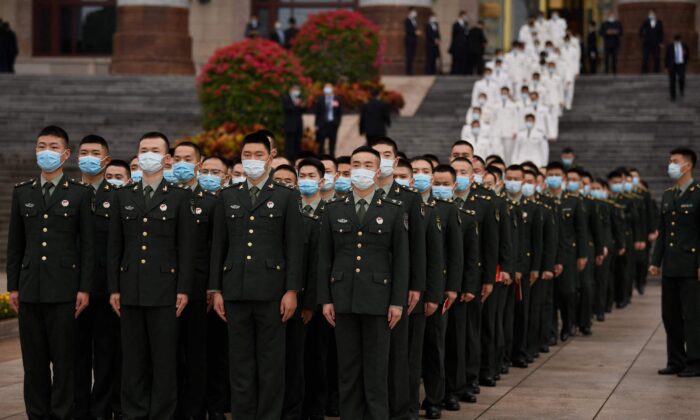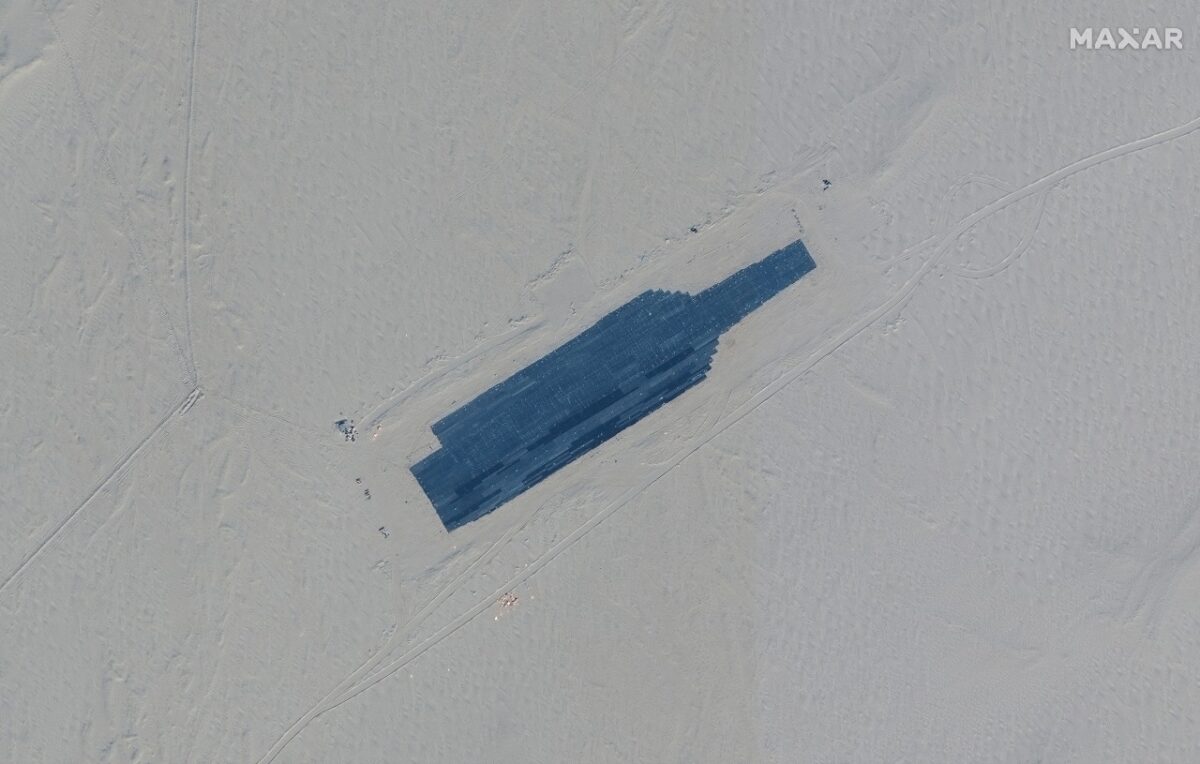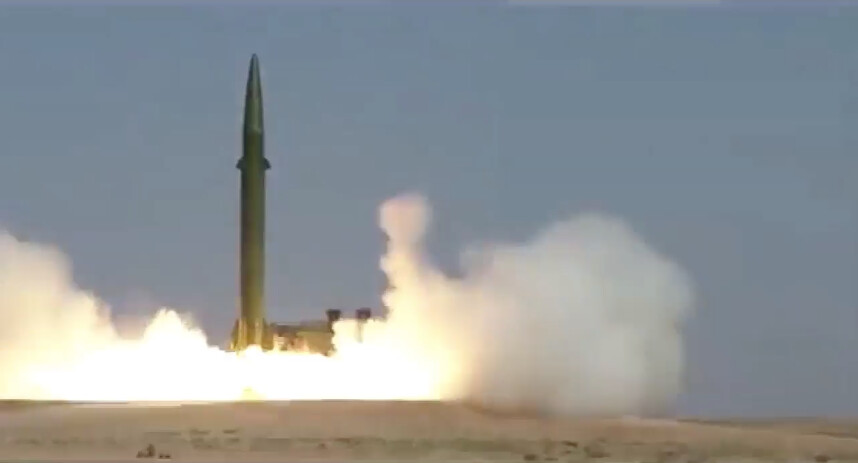 Military delegates stand in formation after the commemoration of the 110th anniversary of the Xinhai Revolution, in Beijing, China, on Oct. 9, 2021. (Noel Celis/AFP via Getty Images)
Military delegates stand in formation after the commemoration of the 110th anniversary of the Xinhai Revolution, in Beijing, China, on Oct. 9, 2021. (Noel Celis/AFP via Getty Images)
Beijing leads an arms race in Asia that could spark war over Taiwan
Anders Corr
March 7, 2022 Updated: March 8, 2022
News Analysis Audio PDF
China’s defense budget will likely increase by approximately
7.1 percent this year, more than last year and the year before, and more than its expected GDP increase.
Beijing is apparently on the warpath, even as U.S. defense budgets have declined over 10 percent over the last decade, and could decline further under President Joe Biden.
The numbers that the regime provides for its defense spending, approximately $229 billion this year, are not trusted by most serious defense analysts and many diplomats. They expect the real numbers to be much higher. The same goes for China’s self-reporting of how many nuclear weapons it has, considered by
military experts to be grossly underreported.
The Danger of a PLA Surprise Attack
Like Putin’s war in Ukraine, be prepared for an unfortunate surprise. Eastern Europe wasn’t engulfed in war when Moscow claimed it was just a series of military exercises. Then came Feb. 24’s attack on democracy that shook the world.
China’s People’s Liberation Army (PLA) is fast on the Russian military’s heels. The PLA is developing and building nuclear warheads, hardened missile silos, hypersonic missiles, stealth fighter jets, aircraft carriers, and amphibious landing craft, which the regime is apparently planning to use to conquer Taiwan, the South China Sea, Japan’s Senkaku Islands, and large swathes of Indian territory in the Himalayan mountains.
If they take these territories, it will only whet Beijing’s thirst for more.
The regime funds more fundamental defense-related science and technology development that some analysts suspect includes banned chemical and biological weapons.
Beijing, Moscow, and Pyongyang are already making veiled threats, with weapons of mass destruction, against the United States and allies like Australia, the Philippines, Taiwan, and Japan.
Much of Beijing’s defense spending is geared to defeat the U.S., British, Australian, Japanese, Taiwanese, and Indian militaries—all are actively working, sometimes well together and sometimes not, to defend their territories and allies.

A satellite picture shows a carrier target in Ruoqiang, Xinjiang, China, on Oct. 20, 2021. (Satellite Image ©2021 Maxar Technologies/Handout via Reuters)
America Forced to Forward Deploy to Asia
The U.S. military has been forced by Beijing’s belligerence to forward deploy to the Taiwan Strait, South China Sea, South Korea, and Japan to defend these areas from China, Russia, and North Korea, which never really ended their belligerent approach after North Korea’s 1950 attack on South Korea. That Korean War that resulted has never officially ended. The Armistice of 1953 is just a pause in hostilities.
The two main defense groupings that Beijing has set itself against are AUKUS, composed of Australia, the United Kingdom, and United States, and the Quadrilateral Security Dialogue (the “Quad”), composed of the United States, Japan, Australia, and India. These are defensive alliances that grew, reluctantly, out of the increasing need in recent years to improve deterrence against Beijing.
China Leads Global Defense Spending Increases
China’s total increase of 7.1 percent in defense spending for 2022 is in line with its approximate
7 percent to 8 percent increases between 2016 and 2021. Between 2012 and 2015, the increases were even higher, at between approximately 10 percent and 12 percent, if China’s official figures are any indication.
This year’s Chinese defense budget increase is well above Beijing’s targeted economic growth of approximately 5.5 percent. China’s economic growth has fallen from its recent high in 2007 of 14.2 percent to 2.3 percent in 2020, according to the regime’s self-reporting. Yet its defense spending continues a meteoric rise, compared to its neighbors.
The notion that a dictatorship’s defense expenditure growth should be at or above its GDP growth only makes sense if the regime is seeking the territory of neighbors. That growth then fuels arms races, which is currently the consequence in Asia.
While the global average change in defense expenditures in 2021 was negative
1.8 percent, Asian military spending increased an average of 2.8 percent. An analysis of relative defense expenditures shows that China is the main aggressor and leading this sorry trend.
Between 2010 and 2020, according to the Stockholm International Peace Research Institute, North American defense budgets fell by almost
11 percent, while Central and East Asian defense budgets grew by 60 percent. Southeast and South Asian defense budgets grew by approximately 40 percent, and European defense budgets grew by about 14 percent.
As a percent of GDP, U.S. defense budgets have decreased from a high in 1967 of 9.4 percent to 3.4 percent in 2019. Yet China’s propaganda consistently paints the United States as the aggressor.
Instead of seeing the American peace dividend as an opportunity to de-escalate global military tensions, Beijing and Moscow have trumpeted the “decline of America” and seen it as an opportunity to grab territory from neighbors.

A screenshot of a June 2, 2020 video created by Beijing officials touting China’s military preparedness against Taiwan. (Screenshot via Facebook)
As a result, the United States may have to abandon its post-1972 attempts at peace and engagement, which is a dangerous necessity in the era of nuclear weapons.
The likely U.S. defense budget for 2023 will exceed
$770 billion, driven just a bit higher year-over-year, even under a Democratic administration. The need to protect democracy in both Europe and Asia simultaneously is severely straining America’s patience and the U.S. economy, which is sinking further into debt. In 2020, U.S. government debt reached almost $28 trillion.
The debt could eventually force the United States into relinquishing its role, since World War II, as a global guarantor of peace. This would be severely destabilizing, and force allies to increase their defense budgets significantly, or get taken over by Moscow and Beijing in the decades to come. Or the United States could seek alternative revenue sources for its provision of the global public good of security, for example, through a
global tax of 30 percent on China’s $4.6 trillion in annual trade.
The Primary Threat to Taiwan
Taiwan appears to be the main object of Beijing’s aggression, perhaps because it illustrates, for the world, the economic success that China could be if Beijing chose the path of democracy. Given the importance of Taiwan to the potential democratization of China, we cannot afford to be caught flat-footed as in Ukraine.
We must be ready to match and exceed anything that Beijing has to throw at this island democracy, which former Secretary of State Mike Pompeo visited this month. He rightly said that the country should be recognized for what it is—a sovereign and independent state.
It should also benefit from an official defense agreement with the United States, forward deployment of U.S. and allied troops on the ground, as well as an independent nuclear deterrent. We must pull out all the stops for Taiwan’s defense. It is that important to the future of global democracy. [More see
PDF]
https://www.theepochtimes.com/chinas...t_4320049.html







